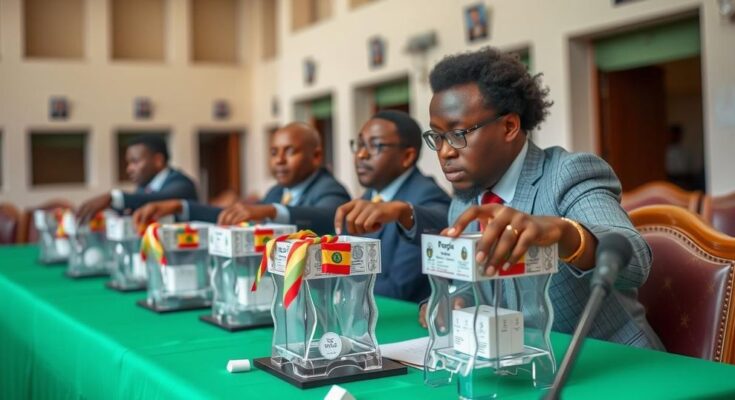Voters in Comoros are electing members for a 33-seat parliament amid accusations of electoral fraud following President Azali Assoumani’s controversial re-election last year. Approximately 338,000 citizens are registered to vote, with a significant number of candidates put forth for election. Political tensions arise from accusations against Assoumani of authoritarianism and a possible dynastic succession plan.
Voters in Comoros are casting their ballots for the archipelago’s 33-seat parliament, following the controversial re-election of President Azali Assoumani last year. Allegations of widespread electoral irregularities accompanied the previous election, claims that officials from the ruling party have categorically denied. Polling stations were opened early on Sunday for approximately 338,000 registered voters, marking the first parliamentary elections since January 2020. Nearly 100 candidates have been authorized by the Supreme Court to participate in the election.
Opposition leaders accuse President Assoumani of excessive authoritarianism and express concerns that he is grooming his eldest son, Nour El-Fath, to succeed him upon the conclusion of his term in 2029. Assoumani, who has maintained power since a coup in 1999 and has subsequently won three elections, granted his son significant authority in 2024, assigning him responsibility for all governmental affairs. While some opposition factions, including Juwa, led by former President Ahmed Abdallah Sambi, have urged voters to boycott the elections due to perceived illegitimacy, other parties have chosen to participate.
Hamidou Karihila, a candidate for the opposition Hope of the Comoros party, stated, “The Azali regime is weakened … by participating in these elections we are contributing to further exposing the flaws in its system and accelerating its inevitable fall.” The election results are anticipated to be released by Friday, highlighting the ongoing political tensions in the region.
The political landscape in Comoros has been tumultuous, primarily influenced by President Azali Assoumani’s extensive tenure characterized by his return to power through a coup. His leadership has sparked allegations of authoritarianism and political manipulation, particularly with concerns surrounding the potential succession by his son. The tension has resulted in various opposition factions contesting the legitimacy of the electoral process, attempting to navigate the balance between participation and outright boycott in an effort to challenge Assoumani’s regime.
The electoral process in Comoros is emblematic of the broader political struggles faced by the country, specifically concerning the legitimacy of President Azali Assoumani’s leadership and the implications of potential dynastic succession. As voters head to the polls, the participation of various opposition parties reflects differing strategies aimed at challenging the ruling government’s authority. The outcomes of these elections will be pivotal in shaping the future of governance in Comoros.
Original Source: www.merimbulanewsweekly.com.au




